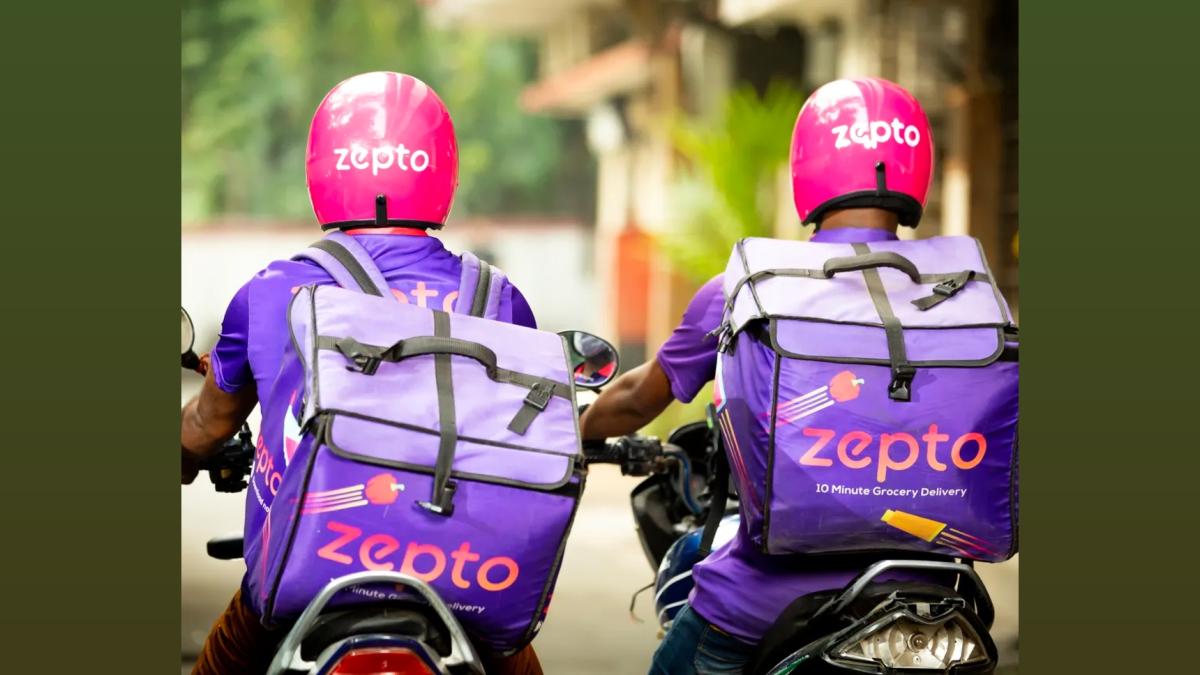FMCG Distributors Raise Concerns Over Quick Commerce Growth
FMCG distributors have expressed concerns over the rapid growth of quick commerce platforms like Blinkit, Zepto, and Instamart, claiming it threatens traditional retail and distribution networks. They've called for scrutiny and government intervention to ensure a fair playing field.

Photograph: Kind courtesy Zepto
New Delhi, Aug 24 (PTI) FMCG distributors have raised concerns over the "rapid and unregulated growth" of quick commerce platforms, saying it needs immediate scrutiny.
In a letter written to Commerce & Industry Minister Piyush Goyal, FMCG distributors' body AICPDF said this unchecked expansion of quick commerce platforms, which typically deliver goods within 10 to 30 minutes, is creating an "uneven playing field", threatening the livelihoods of millions of small retailers and distributors who have been the backbone of India's retail sector for decades.
The All India Consumer Products Distributors Federation (AICPDF) also suspected potential violations of FDI regulations by these quick-commerce companies and sought an immediate investigation into the operational models of these platforms.
The rapid growth of quick commerce platforms like Blinkit, Zepto and Instamart has posed significant challenges to the traditional retail sector and the established fast-moving consumer goods (FMCG) distribution network.
"We are witnessing the erosion of small "mom-and-pop" stores and a shift in the FMCG distribution landscape, as these platforms are increasingly being appointed as direct distributors by major FMCG companies, side-lining traditional distributors," AICPDF said in the letter.
While raising concerns regarding the compliance of foreign direct investment (FDI) regulations by the quick-commerce platforms, it said AICPDF suspects them of blurring the lines between the marketplace and inventory-based models.
"The FDI rules clearly prohibit e-commerce entities operating under the marketplace model from holding inventory or exercising control over the inventory sold on their platforms.
"However, it appears that these quick commerce platforms may be engaging in practices that blur the lines between a marketplace and an inventory-based model, potentially violating FDI norms," it noted.
It also requested the government to "initiate a thorough investigation into the operational models of these quick commerce platforms to ensure compliance with FDI regulations" and to "implement protective measures for small retailers and traditional distributors to safeguard their interests and prevent monopolistic practices".
AICPDF has urged the government to facilitate a dialogue between all stakeholders, including representatives from the retail sector, FMCG companies and quick commerce platforms, to establish fair and equitable business practices.
It also appreciated Goyal's recent remarks, where he lambasted the e-commerce companies, questioning their business model that has been impacting small retailers in the country.
Earlier this week, the Commerce and Industry Minister had questioned Amazon's announcement of USD 1 billion investment in India, saying the US retailer was not doing any great service to the Indian economy but filling up for the losses it had suffered in the country.
He said that their huge losses in India "smells of predatory pricing", which is not good for the country as it impacts crores of small retailers.
The quick-commerce market in India is currently valued at approximately USD 5 billion.
Several FMCG companies, in their latest June quarter earning, reported a high double-digit growth coming from quick-commerce in online sales.
In the quick-commerce space, companies like Blinkit, Zepto, and Swiggy's Instamart have established a strong presence. Recently Ola, one of the leading players in the ride-hailing industry, announced entry into quick-commerce.
In a letter written to Commerce & Industry Minister Piyush Goyal, FMCG distributors' body AICPDF said this unchecked expansion of quick commerce platforms, which typically deliver goods within 10 to 30 minutes, is creating an "uneven playing field", threatening the livelihoods of millions of small retailers and distributors who have been the backbone of India's retail sector for decades.
The All India Consumer Products Distributors Federation (AICPDF) also suspected potential violations of FDI regulations by these quick-commerce companies and sought an immediate investigation into the operational models of these platforms.
The rapid growth of quick commerce platforms like Blinkit, Zepto and Instamart has posed significant challenges to the traditional retail sector and the established fast-moving consumer goods (FMCG) distribution network.
"We are witnessing the erosion of small "mom-and-pop" stores and a shift in the FMCG distribution landscape, as these platforms are increasingly being appointed as direct distributors by major FMCG companies, side-lining traditional distributors," AICPDF said in the letter.
While raising concerns regarding the compliance of foreign direct investment (FDI) regulations by the quick-commerce platforms, it said AICPDF suspects them of blurring the lines between the marketplace and inventory-based models.
"The FDI rules clearly prohibit e-commerce entities operating under the marketplace model from holding inventory or exercising control over the inventory sold on their platforms.
"However, it appears that these quick commerce platforms may be engaging in practices that blur the lines between a marketplace and an inventory-based model, potentially violating FDI norms," it noted.
It also requested the government to "initiate a thorough investigation into the operational models of these quick commerce platforms to ensure compliance with FDI regulations" and to "implement protective measures for small retailers and traditional distributors to safeguard their interests and prevent monopolistic practices".
AICPDF has urged the government to facilitate a dialogue between all stakeholders, including representatives from the retail sector, FMCG companies and quick commerce platforms, to establish fair and equitable business practices.
It also appreciated Goyal's recent remarks, where he lambasted the e-commerce companies, questioning their business model that has been impacting small retailers in the country.
Earlier this week, the Commerce and Industry Minister had questioned Amazon's announcement of USD 1 billion investment in India, saying the US retailer was not doing any great service to the Indian economy but filling up for the losses it had suffered in the country.
He said that their huge losses in India "smells of predatory pricing", which is not good for the country as it impacts crores of small retailers.
The quick-commerce market in India is currently valued at approximately USD 5 billion.
Several FMCG companies, in their latest June quarter earning, reported a high double-digit growth coming from quick-commerce in online sales.
In the quick-commerce space, companies like Blinkit, Zepto, and Swiggy's Instamart have established a strong presence. Recently Ola, one of the leading players in the ride-hailing industry, announced entry into quick-commerce.
You May Like To Read
TODAY'S MOST TRADED COMPANIES
- Company Name
- Price
- Volume
- Vodafone-Idea
- 11.36 ( -2.49)
- 94664837
- AvanceTechnologies
- 1.16 (+ 4.50)
- 34522155
- Sunshine-Capital
- 0.26 ( -3.70)
- 29015901
- Alstone-Textiles
- 0.27 ( -3.57)
- 28695959
- Mehai-Technology
- 1.65 ( -4.62)
- 28262795






